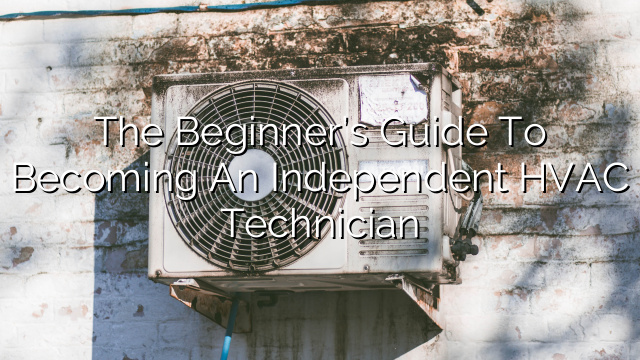Introduction
Are you interested in a rewarding career as an HVAC technician? Becoming an independent HVAC technician can provide you with the freedom and flexibility to build your own business, set your own schedule, and earn a lucrative income. In this beginner’s guide, we will walk you through the steps to start your journey as an independent HVAC technician.
What is an HVAC Technician?
HVAC stands for Heating, Ventilation, and Air Conditioning. An HVAC technician is a trained and skilled professional who installs, repairs, and maintains heating, cooling, and ventilation systems in residential, commercial, and industrial buildings. HVAC technicians are in high demand due to the constant need for climate control and air quality regulations.
Getting Started as an HVAC Technician
Educational Requirements
- Analyze personal attributes: To become a successful HVAC technician, it is important to possess certain personal attributes such as problem-solving skills, attention to detail, physical fitness, and mechanical aptitude.
- High school diploma or equivalent: Most employers require a high school diploma or GED equivalent as a minimum educational requirement.
- Attend a trade school or technical program: Enrolling in a reputable HVAC trade school or technical program will provide you with the necessary knowledge and skills to become an HVAC technician.
- Hands-on training: Completing an apprenticeship or on-the-job training program will give you practical experience and help you develop the necessary skills to succeed as an HVAC technician.
- Licensing and certification: Check your local and state requirements for licensing and certification as these vary depending on your location.
Building Skills and Experience
- Continuous learning: Keep up with the latest HVAC technologies, industry trends, and codes by attending seminars, workshops, and online courses.
- Hands-on experience: Seek opportunities to gain hands-on experience by working alongside experienced HVAC technicians or completing internships.
Starting Your Own HVAC Business
Create a business plan
A well-thought-out business plan is essential for the success of your independent HVAC business. This plan should outline your goals, target market, services offered, pricing structure, marketing strategies, and financial projections.
Obtain necessary licenses and permits
Research the licensing requirements in your area and obtain all necessary permits and licenses to operate your HVAC business legally.
Purchase tools and equipment
Invest in high-quality tools and equipment to ensure that you can perform your HVAC services effectively and efficiently.
Consider insurance
Insurance is crucial to protect your business, employees, and clients. Obtain liability insurance and workers’ compensation insurance to safeguard against any unforeseen accidents or damages.
Market your business
- Create a professional website: A website allows potential clients to learn more about your services and contact you easily.
- Use online directories: Register your business in online directories specific to the HVAC industry to increase your online presence.
- Implement online marketing strategies: Use search engine optimization (SEO) techniques, social media marketing, and pay-per-click advertising to reach your target audience.
- Network: Attend industry conferences, join professional organizations, and build relationships with other professionals in the field.
Frequently Asked Questions
1. How long does it take to become an HVAC technician?
The time it takes to become an HVAC technician can vary depending on your educational path and the specific requirements in your area. On average, it may take 6 months to 2 years to complete a trade school or technical program, followed by an apprenticeship of 2-5 years.
2. How much does an HVAC technician earn?
The salary of an HVAC technician can vary depending on factors such as location, experience, and specialization. The average annual salary for an HVAC technician is around $50,000, but experienced technicians can earn significantly more.
3. Can I start my own HVAC business without any experience?
While some experience in the HVAC industry is beneficial, it is possible to start your own HVAC business without prior experience. However, it is important to gain the necessary skills, knowledge, and certifications to provide quality services to your clients.
4. Is HVAC a good career choice?
Yes, HVAC is a great career choice for individuals who enjoy working with their hands, solving problems, and working in a variety of settings. The demand for HVAC technicians continues to grow, providing stable job opportunities and room for career advancement.
5. What are the common challenges faced by HVAC technicians?
Some common challenges faced by HVAC technicians include working in extreme weather conditions, encountering difficult and complex system malfunctions, and the physical demands of the job. However, with the right training and experience, these challenges can be overcome.
6. Are there opportunities for specialization in the HVAC field?
Yes, there are opportunities for specialization in the HVAC field. Some common specializations include residential HVAC, commercial HVAC, refrigeration, and air quality control. Specializing in a specific area can help you stand out from the competition and increase your earning potential.
7. How can I stay updated on the latest HVAC technologies and regulations?
Continuing education is crucial for HVAC technicians to stay updated on the latest technologies and regulations. Attend seminars, workshops, and online courses offered by reputable organizations in the HVAC industry to expand your knowledge and skills.
8. What are the working hours for an independent HVAC technician?
As an independent HVAC technician, you have the flexibility to set your own working hours. However, it is important to keep in mind that HVAC emergencies can arise at any time, so you may need to be available for after-hours service calls.
9. How can I ensure customer satisfaction in my HVAC business?
To ensure customer satisfaction in your HVAC business, prioritize timely response to service calls, provide accurate and transparent pricing, deliver high-quality work, and consistently communicate with your clients throughout the process.
10. How can I expand my HVAC business?
To expand your HVAC business, consider offering additional services such as maintenance contracts, energy efficiency upgrades, and system upgrades. Build a strong reputation through excellent customer service and positive reviews, and expand your network through partnerships with other professionals in related industries.
Conclusion
Becoming an independent HVAC technician can be a rewarding and lucrative career choice. By following the steps outlined in this beginner’s guide, you can start your journey towards starting your own HVAC business and enjoying the freedom and flexibility that come with being an independent professional. Remember to continually educate yourself, build your skills and experience, and provide exceptional service to your clients to establish a successful career as an HVAC technician.









